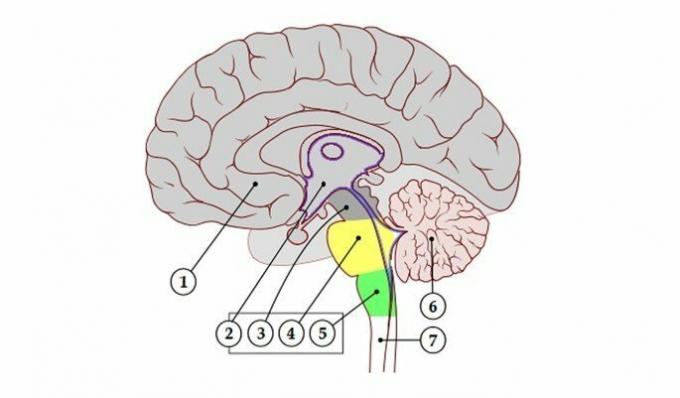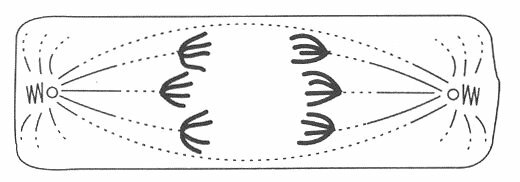Since we have months of 28, 30, and 31 days, some doctors often suggest that calculations for a woman's length of pregnancy be done according to the lunar calendar. This basically means considering the following:
- 1 lunar week = 7 days
- 1 lunar month = 4 weeks of 7 days = 28 days
As the period between the beginning of pregnancy and the day of delivery is about 280 days, we can see that this value corresponds to 40 weeks. Since a lunar month is 4 weeks, 40 weeks of pregnancy corresponds to 10 lunar months.
Now that you understand these accounts, let's move on to talking about the second month of pregnancy. During this period, between the 5th and 8th lunar week, the zygote is called an embryo. It undergoes rapid cell development, initially showing about 1 centimeter in length, ending this phase with approximately 17 centimeters; when your body is more erect and elongated.
It is in this period of time that your limbs, feet, hands and fingers develop, and also when the heart, already with the four cavities, starts the execution of successive systoles and diastoles, starting the circulation blood. The veins are very visible, as their skin is quite thin and slightly transparent.
It is also here that facial features begin to emerge, the skeleton begins to develop, as do muscles and other bodily systems; and the neural tube closes completely.
The eyes also form, but without iris or eyelids. In addition to them, the ears and mouth, as well as the placenta and umbilical cord, are already visible in the fetus. It also starts to move, subtly.
As for the mother, it is usually at this stage that she suspects or already discovers that she is pregnant, when it is not a carefully planned pregnancy. Thus, to confirm the suspicion, the doctor requests a specific test and, if so, others will also be necessary, with the purpose of checking the health of the pregnant woman and identifying or ruling out problems that may affect her health and that of the future kid.
The suspicion of pregnancy is mainly related to one or more of these symptoms: significant breast enlargement, less defined waistline, frequent urination, gastrointestinal changes (including nausea, caused mainly by the constant increase in the hormone beta-hCG), excessive salivation, tiredness, drowsiness and greater emotionality. Besides them, the pregnant woman can notice that her nails are more resistant and her sense of smell, more refined. She may also feel craving for unusual foods, as well as repulsion to some and also to certain smells: it is malacia, another typical symptom of pregnancy.
The nipples tend to darken, and the gums become more sensitive. There is also the possibility of nail spots and pimples on the skin, due to hormonal changes.
Finally, although the growth of the abdomen is not very noticeable, especially if it is a first pregnancy; the pregnant woman may experience pain in the lower abdomen, related to the growth and/or contraction of the uterus.
Feeding the pregnant woman:
Do not stop now... There's more after the advertising ;)
In addition to increasing beta-hCG levels, taking iron-containing supplements can also cause nausea. Thus, it may be interesting to seek guidance from a nutritionist, in order to include, in the diet, foods that meet the demand for this nutrient. To improve its use by the body, it is important to eat foods rich in vitamin C, such as kiwi, acerola, orange, lemon and tangerine.
Because constipation can occur, it's a good idea to eat fiber-rich foods like apples and cereals; and drink plenty of fluids – which also help to hydrate the body and release toxins. On the other hand, canned goods, sweets and pasta can, in addition to worsening these symptoms, cause nausea and gas.
Caffeine-rich foods such as coffee, chocolate, some soft drinks and mate tea should be avoided or eaten with caution, since the excess of such substance can influence the growth and development of cells fetal.
Important:
To deal with nausea, a good tip is to avoid overeating, or going without food for a long time. The ideal, therefore, is to ingest small portions, approximately every three hours. Also, ice water, ginger tea and lemon juice can help too.
Splitting meals, chewing slowly, is interesting because, in addition to helping to prevent nausea, it helps control the weight of the pregnant woman, allowing her not to gain significant weight or weight, which is not good for her or her health. kid.
The consumption of alcoholic beverages, as well as medicines without medical advice or consent, and the use of cigarettes; are inadvisable attitudes, as they can compromise the baby's development. The use of chemical products on hair, such as straightening creams and dyes, should also be avoided, as some substances of its composition can enter the mother's bloodstream, and be directed to the embryo.
To avoid exhaustion, the ideal is to sleep approximately eight hours a night, and to practice moderate physical exercise, such as walking.
See more!
first month of pregnancy
Third month of pregnancy
By Mariana Araguaia
Biologist, specialist in Environmental Education
Brazil School Team



